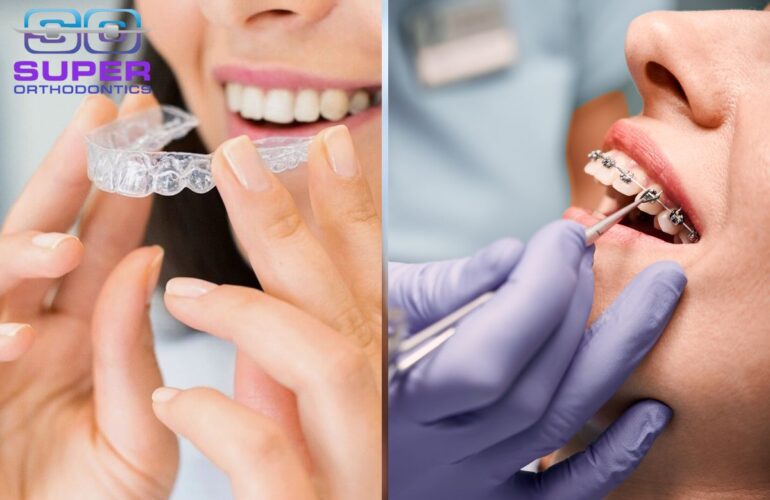For many people considering braces, one common question is, “Will braces change how I speak?”
Initially, the answer is yes, but not to worry—these effects are generally short-lived and improve or go away with time.
Braces often cause slight speech changes when they’re first placed as the mouth adapts to the new hardware. This is because the brackets and wires alter the physical landscape inside the mouth, slightly changing how the tongue moves and affecting certain sounds.
At Super Orthodontics, Dr. Amir Assefnia, DDS, MDS, MS, board certified orthodontist, is experienced in guiding patients through these changes. With personalized care and reassurance, we work closely with patients to help them adjust comfortably.
How Braces Can Affect Speech in the Early Stages
When braces are first applied, it’s common for patients to experience minor speech issues. This adjustment period can lead to a mild lisp or difficulty pronouncing certain sounds, especially those that require precise tongue placement, like “s” and “z.” This occurs because the braces slightly alter the space in the mouth, causing the tongue to find a new way to position itself around the brackets.
Physical changes, such as the additional hardware, can disrupt natural tongue movements, especially when trying to form specific sounds. Fortunately, as the mouth becomes accustomed to the braces, these speech issues tend to improve. Practicing specific sounds and being patient can help speed up the adaptation process, making it easier to speak comfortably.
Why Speech Changes Happen with Braces
Understanding why braces impact speech requires a closer look at how braces function mechanically. Brackets and wires occupy additional space, which affects how the tongue moves and positions itself during speech. The tongue relies on the roof of the mouth, teeth, and lips to articulate different sounds. When braces are placed, they disrupt this natural movement, leading to a temporary adjustment period.
Dr. Amir Assefnia explains to his patients that this adjustment period is typical as the body learns to adapt to the new conditions in the mouth. For instance, the presence of brackets can alter airflow, which may impact sounds requiring a steady stream of air. These changes are a normal part of the orthodontic process and typically resolve as patients become more accustomed to their braces.
How Long Does It Take to Adjust to Speaking with Braces?
Adjusting to speaking with braces usually doesn’t take long. For most people, any speech-related issues tend to reduce within a few weeks. During this acclimation period, the mouth learns to work around the braces, and the tongue and lips adapt to the new positioning required to form sounds correctly.
This period of adjustment varies from person to person, but generally, patients report feeling more comfortable after the first two to three weeks. As patients adapt, they regain their natural speech patterns, and any temporary lisp or difficulty fades. Remaining patient and practicing challenging sounds can help the process go more smoothly.
How Braces Improve Clarity Over Time
While braces can cause short-term speech changes, the long-term benefits often outweigh these temporary inconveniences. By correcting alignment and bite issues, braces can lead to improved speech clarity over time. When teeth are properly aligned, it becomes easier to pronounce words accurately, and bite issues that may interfere with clear speech are corrected.
Braces also contribute to more confident speech. Proper alignment of teeth and jaw not only improves the appearance of the smile but also enhances the clarity of sounds. This correction results in clearer, more precise speech, making communication more effective and enjoyable for the patient.
Speech Issues Braces Can Help Correct
1. Lisping: Misaligned teeth, including open bites or diastema (gaps), can cause a lisp by affecting tongue placement. Braces align teeth to reduce lisping and improve the pronunciation of sounds like “s” and “z.”
2. Articulation Disorders: Misaligned bites and irregular incisors can make it difficult to pronounce sounds like “t,” “d,” “s,” “sh,” and “ch.” Braces help align these teeth, aiding in clearer articulation.
3. Overbite/Underbite Speech Impediments: Overbites, underbites, and irregular upper anterior teeth interfere with lip and tongue movement, affecting sounds like “p,” “b,” and “m.” Braces adjust the bite, enhancing sound clarity.
4. Whistling Sounds: Gaps between teeth (diastema) can create a whistling sound on “s” sounds. Braces close these gaps, helping to eliminate the whistling effect.
5. Jaw Alignment Issues: Misaligned jaws can cause slurred or unclear speech. Braces align the jaw and teeth, supporting clearer, more natural speech.
6. Cleft Palate Support: Braces can help individuals with cleft palates by improving alignment. This helps achieve clearer speech and better pronunciation across a range of sounds.
The Role of Super Orthodontics in Speech and Orthodontic Treatment
At Super Orthodontics, Dr. Amir Assefnia is dedicated to helping patients feel confident throughout their orthodontic journey. He and his team are committed to providing support during the speech adjustment period and offering personalized care and encouragement at each stage of treatment. The practice’s expertise and patient-centered approach make the transition with braces as comfortable as possible, addressing each patient’s unique needs.
By providing resources and guidance, Super Orthodontics ensures that patients are well-prepared for each part of the adjustment process. We prioritize patient comfort and long-term benefits, including improved speech and alignment.
Frequently Asked Questions About Braces and Speech Impact
Will braces permanently affect my speech?
No, speech changes with braces are usually temporary. Most patients adjust within a few weeks as they adapt to the braces.
What can I do if I develop a lisp with braces?
Practicing difficult sounds, reading aloud, and using orthodontic wax to reduce friction can help. The lisp typically improves with time.
How long will it take to speak normally with braces?
Most people acclimate within two to three weeks. Practicing challenging sounds during this period can help speed up the process.
Embrace the Journey to Better Speech and Alignment with Braces
Though braces may cause temporary changes in speech, they ultimately lead to long-term benefits in clarity and confidence. Over time, as teeth and jaws become better aligned, speech often improves, creating a clearer and more precise way of speaking. For those in Encino and Los Angeles, CA, Dr. Amir Assefnia at Super Orthodontics offers expert guidance to make this journey smoother.
If you’re ready to begin your journey toward better alignment and speech clarity, consider a consultation with Super Orthodontics. With our patient-centered approach, you’ll receive the support and care needed to make the most of your orthodontic experience.





